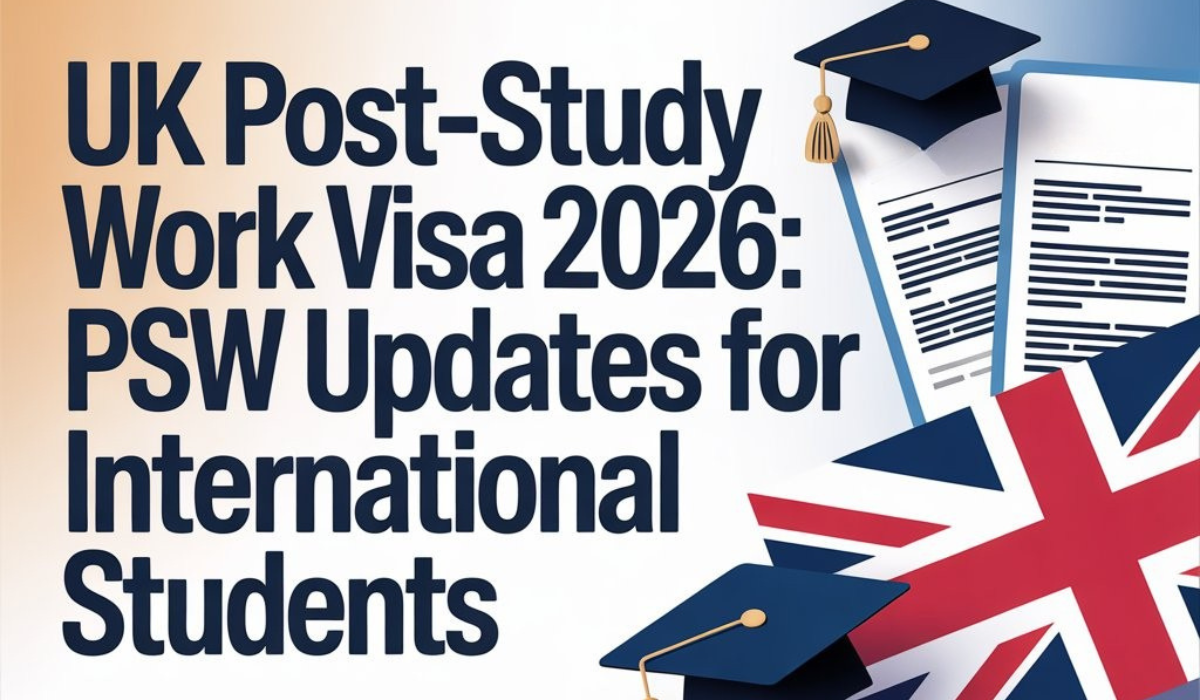For many international students, the UK Post-Study Work Visa (PSW) is a crucial factor when deciding where to pursue higher education.
The opportunity to stay and work in the UK after graduation not only helps recover education expenses but also provides valuable global career exposure.
As we move towards 2026, new updates and policy adjustments are shaping how the UK Post-Study Work Visa benefits international graduates.
These changes aim to make the UK more competitive compared to other study destinations like Canada and Australia, offering greater flexibility and job prospects.
Genius Study Abroad, we’ll break down the latest PSW updates for 2026, including eligibility, application process, duration, and what these changes mean for future international students planning to study and work in the UK.
Read More : Study in UK 2026: Best Universities, Courses & Fees
What Is the UK Post-Study Work Visa (Graduate Route)?

The UK Post-Study Work Visa, officially known as the Graduate Route, allows international students who have completed a degree in the UK to stay back and work or look for employment after graduation.
Introduced in July 2021, this visa was designed to make the UK a more attractive destination for global talent after the earlier Tier 1 (Post-Study Work) route was discontinued in 2012.
Under the UK Post-Study Work Visa, eligible students can remain in the country for up to 2 years after completing an undergraduate or master’s degree, and 3 years after completing a PhD.
During this period, graduates are free to work in any role—without needing sponsorship from an employer—and can switch to a skilled worker visa later if they secure a qualifying job.
This is a major improvement compared to past visa rules, which required students to leave the UK immediately after completing their studies unless they had a job offer with a sponsoring employer.
Now, with the Graduate Route, the UK gives graduates more independence to explore opportunities, gain experience, and build their careers.
At Genius Study Abroad, we help students understand how to make the most of the UK Post-Study Work Visa, ensuring they plan their studies and career goals strategically to take full advantage of this opportunity.
Read More : UK Intakes 2026 Explained: January, May & September Admissions
Why the 2026 Reforms Matter
The UK Post-Study Work Visa has always been a key element in attracting international students—but the 2026 reforms are emerging amid a changing political and policy environment.
Following the UK government’s Immigration White Paper and its focus on reducing net migration figures, policymakers are reassessing how the Graduate Route balances economic benefits with immigration control.
While the goal is to maintain the UK’s global appeal to international talent, universities now face increased compliance expectations.
Institutions must ensure students meet visa conditions, avoid misuse of the route, and align with new sponsorship and reporting standards. This shift puts pressure on universities to uphold their credibility while still supporting international enrollment growth.
For students, the 2026 updates could redefine what it means to work and stay in the UK after graduation—potentially influencing visa duration, eligible institutions, or the kind of jobs allowed under the scheme.
However, experts note that restricting the UK Post-Study Work Visa too much could reduce the country’s competitiveness compared to nations like Canada and Australia, where post-study work rights remain a major attraction.
At Genius Study Abroad, we closely track these developments to guide students on how upcoming reforms may impact their future in the UK—and how to make informed choices when planning their education abroad.
Read More : UK Student Visa fee 2026: Latest Rules, Requirements & Application Guide
Proposed Changes in PSW 2026 & Their Rationale
The UK Post-Study Work Visa reforms expected in 2026 are part of a broader effort to balance international education opportunities with the government’s evolving immigration goals.
While the Graduate Route remains a strong attraction, several proposed changes could reshape how international graduates stay and work in the UK after completing their studies.
Reduced Duration for Undergraduates and Master’s Students
The government is reportedly considering shortening the post-study stay from 24 months to 18 months for undergraduate and master’s degree holders, while PhD graduates may continue to receive 3 years.
The rationale behind this move is to encourage quicker transitions into skilled employment or further study while managing long-term immigration pressures.
Stricter Institutional Compliance
Only universities meeting higher standards of compliance and student completion rates may retain access to the Graduate Route.
This measure aims to ensure that only credible institutions benefit from the program and that the UK Post-Study Work Visa continues to attract genuine, high-quality students.
Revised English Language / SELT Requirements
The 2026 reforms could introduce tighter English proficiency benchmarks, requiring new Secure English Language Test (SELT) verification even for students who completed degree-level study in English.
This reflects the UK’s intent to ensure graduates are job-ready for its labor market.
Enhanced Qualification Verification
A stronger degree verification process will likely be implemented before granting the visa. This measure would help prevent misuse and ensure that only students who have genuinely completed their programs can apply.
Restrictions on Benefits, Dependents, and Extensions
Access to public benefits, dependent visas, and potential extensions may face stricter eligibility checks. The aim is to keep the focus of the PSW purely on work experience and career development rather than settlement.
Implementation & Transitional Provisions
The reforms are expected to roll out gradually through late 2025 to early 2026, with transitional protections for those already studying or applying before the new rules take effect.
While these changes may seem restrictive, they reflect the government’s attempt to maintain control over migration while keeping the UK competitive in global education.
At Genius Study Abroad, we help students navigate these updates and plan their study paths strategically to make the most of the UK Post-Study Work Visa before and after 2026.
Read More : Which course has the highest salary in abroad?
Who Will Be Affected & Transitional Safeguards
The upcoming UK Post-Study Work Visa (PSW) reforms in 2026 are expected to affect international students differently depending on when they begin their courses and what level of study they pursue. Understanding these distinctions is essential for planning ahead and avoiding surprises.
Students Starting Before the Cut-Off Date
Those who begin their studies before the new regulations officially take effect will likely remain under the current Graduate Route rules. This principle—known as “grandfathering”—means that existing students won’t lose their rights to the 2-year or 3-year post-study stay even if new rules are introduced.
For example, students graduating in mid-2025 would still enjoy the current PSW benefits.
PhD and Research Students vs. Taught Degree Students
PhD and research scholars are expected to face fewer changes, as their 3-year post-study stay supports the UK’s research and innovation goals.
In contrast, undergraduate and master’s graduates could see their work rights reduced to 18 months. The UK government views PhD-level talent as vital for academic and scientific growth, offering them slightly more lenient policies.
Transitional Rules and Protections
Transitional safeguards will likely ensure fairness—students who have already received university offers or visa approvals under existing PSW guidelines will still be protected.
The UK Home Office generally announces reforms well in advance to allow universities, visa sponsors, and students to adapt accordingly.
Regional and Institutional Differentiation
The reforms may also lead to institutional or regional variations, where only universities with high compliance ratings or strong graduate outcomes retain full access to the UK Post-Study Work Visa benefits.
This could encourage universities outside London and the Southeast to improve student support and job placement efforts.
While the finer details are still emerging, one thing is clear—the 2026 reforms will reshape how students plan their education timelines and visa applications.
At Genius Study Abroad, we’re committed to helping students understand their eligibility, timelines, and best strategies to maximize their opportunities under the evolving UK Post-Study Work Visa system.
Read More : 1-Year Master in UK for International Students 2025
Eligibility Criteria & Required Documents (Current vs Proposed)

The UK Post-Study Work Visa allows international graduates to remain in the UK after completing their studies, but eligibility criteria and required documentation are essential for a smooth application—especially with proposed 2026 reforms.
Current Eligibility
To qualify under the existing Graduate Route:
- Valid Student Visa: Applicants must hold a current UK Student visa.
- Degree Completion: Must have successfully completed a degree at a licensed UK higher education institution.
- Notification to Home Office: The institution must notify the UK Home Office of course completion.
- Immigration Compliance: Applicants must not have breached any UK immigration rules during their stay.
Proposed Changes (2026)
The 2026 reforms may introduce stricter criteria, including:
- Reduced Duration: Undergraduates and master’s graduates may be eligible for only 18 months, while PhD students may remain at 3 years.
- Enhanced Verification: More rigorous confirmation of degree completion before visa approval.
- English Language Requirements: Additional Secure English Language Test (SELT) verification may be required.
- Institutional Compliance: Only students from universities meeting higher compliance and enrollment thresholds may qualify.
Required Documents
Applicants typically need to prepare:
- Passport (original + copies)
- Academic Transcripts
- Confirmation of Award / Degree Certificate
- Bank Statements (to prove financial stability, if requested)
- Current Visa and Biometric Residence Permit (BRP)
- English Language Proof (if newly required)
Tips for Preparation
- Verify University Status: Ensure your institution is licensed for Graduate Route sponsorship.
- Keep Documents Organized: Maintain clear, updated copies of all academic and visa documents.
- Plan Ahead: Submit the application promptly after course completion to avoid gaps.
- Seek Expert Guidance: Agencies like Genius Study Abroad can help verify eligibility, prepare documents, and guide students through the application process efficiently.
By carefully meeting these criteria and preparing documents in advance, international students can maximize their chances of successfully obtaining the UK Post-Study Work Visa, even with upcoming 2026 reforms.
Read More : Best UK Education Consultants in India – Genius Study Abroad
Application Process, Costs & Timeline
Navigating the UK Post-Study Work Visa application is straightforward if you understand the steps, costs, and timelines. Here’s a practical guide for international students:
Step-by-Step Guide
- Check Eligibility: Ensure you meet all current or proposed criteria, including degree completion and institutional compliance.
- Prepare Documents: Collect your passport, BRP, academic transcripts, confirmation of award, and English language proof if required.
- Apply Online: Submit your application via the UK Home Office visa portal. Applications must be made before your current Student visa expires.
- Biometrics Appointment: Some applicants may need to attend a biometric appointment to provide fingerprints and a photograph.
- Receive Decision: Wait for confirmation. Decisions are typically communicated via email or online account.
Costs
- Visa Fee: Currently £715 for most international students (subject to updates).
- Immigration Health Surcharge (IHS): Around £624 per year, granting access to the UK’s National Health Service (NHS) during your stay.
Processing Times
- Standard decisions usually take 8 weeks, but expedited services may be available at higher fees.
- Applicants are advised to apply as soon as possible after receiving confirmation of degree completion to avoid gaps in visa status.
Cancellation or Withdrawal
- If you need to cancel or withdraw your application, contact the UK Home Office immediately.
- Fees are generally non-refundable, except in cases where the Home Office makes an error.
With careful preparation, the UK Post-Study Work Visa application can be smooth and stress-free. Agencies like Genius Study Abroad provide step-by-step support to ensure students complete the process correctly, on time, and maximize their post-study work opportunities.
Read More : Best IELTS Coaching in Delhi 2025 | Online & Offline Classes
Benefits, Limitations & Work Rights Under PSW
The UK Post-Study Work Visa offers international graduates a unique opportunity to gain work experience and build a career in the UK. Understanding both the advantages and limitations helps students plan effectively.
Benefits: What You Can Do
- Work Flexibly: You can take up any job, whether full-time, part-time, or temporary.
- Self-Employment: Graduates are allowed to start their own business or freelance.
- Voluntary Work: Engaging in unpaid or voluntary work is fully permitted.
- Career Building: The visa provides valuable UK work experience, which can be leveraged for future skilled worker visas or permanent roles.
- Duration: Under current rules, undergraduate and master’s graduates can stay for 2 years, while PhD graduates can stay for 3 years.
Limitations: What You Cannot Do
- Public Funds: PSW holders cannot access UK welfare benefits such as Universal Credit or Housing Benefit.
- Professional Sports: Working as a professional sportsperson or coach is not allowed.
- Extension Restrictions: The visa cannot be extended beyond its duration; switching to another visa is required for longer stays.
Impact of Proposed 2026 Changes
- Reduced Duration: Undergraduates and master’s graduates may only get 18 months, slightly limiting long-term career planning.
- Stricter Compliance: Tighter verification and eligibility criteria may restrict access to PSW for students from non-compliant institutions.
- Benefit Access: Proposed rules may further limit entitlements for dependents or access to certain support programs.
At Genius Study Abroad, we guide students on how to maximize the benefits of the UK Post-Study Work Visa, navigate its limitations, and plan strategically to make the most of their post-graduation experience in the UK.
Read More : Best Consultancy in India for Abroad Studies | Top Study Abroad Experts 2025
Transitioning from PSW to Skilled Worker & Other Routes

The UK Post-Study Work Visa is a temporary route designed to help international graduates gain work experience, but most students will eventually need to transition to a longer-term visa if they wish to remain in the UK.
Moving to Skilled Worker Visa
- Why Transition Is Needed: The PSW has a fixed duration—currently 2 years for undergraduates/masters and 3 years for PhDs—so graduates aiming for long-term employment must switch to a Skilled Worker visa or another eligible route before their PSW expires.
- Requirements: To qualify for a Skilled Worker visa, graduates must secure a job from a licensed UK employer sponsor, meet minimum salary thresholds (generally £26,200–£30,960 depending on the role), and hold a position at an approved skill level.
- Timing & Strategy: Applying well before your PSW expires is critical. Ideally, students should start job applications during their PSW period and have their visa application ready once an offer is confirmed.
Alternative Routes
- Global Talent Visa: For students with exceptional skills in science, humanities, engineering, medicine, or arts.
- Innovator Founder / Start-Up Visas: For graduates planning to launch innovative businesses in the UK.
- Family or Dependent Routes: If eligible, graduates can join family members already residing in the UK.
By planning early, international students can ensure a smooth transition from the UK Post-Study Work Visa to a longer-term visa, maximizing career and settlement opportunities.
Genius Study Abroad provides personalized guidance to help students identify the most suitable visa route and manage the application process effectively.
Strategic Planning: What Students Should Do Now
With the UK Post-Study Work Visa reforms on the horizon, international students need to plan proactively to maximize their post-graduation opportunities. Here are key strategies to consider:
Start Networking Early
Build connections with potential employers, attend career fairs, and participate in internships. Early networking increases the chances of securing a job before your PSW expires.
Upgrade Skills and Certifications
Enhance your employability by gaining industry-relevant skills, certifications, and training. A strong CV showcasing both academic achievement and practical experience is crucial.
Choose Universities Wisely
Select institutions with high compliance standards and strong graduate employment outcomes. These universities are less likely to face restrictions under the 2026 reforms, ensuring your eligibility for the PSW.
Monitor Official Announcements
Stay updated on UK Home Office guidelines, visa deadlines, and any transitional rules. Being informed ensures you can act quickly if regulations change.
Plan Financially
Budget for visa fees, the Immigration Health Surcharge (IHS), and other application-related costs. Consider contingency funds in case of delays or additional requirements under the new rules.
By taking these steps, students can strategically navigate the PSW landscape, minimize risks, and make the most of the UK Post-Study Work Visa opportunities.
At Genius Study Abroad, we help students create actionable plans to align their education, career, and visa strategies effectively, ensuring a smooth post-study transition.
Risks, Pitfalls & Common Mistakes to Avoid
While the UK Post-Study Work Visa offers great opportunities, international students must navigate it carefully to avoid costly mistakes. Here are common pitfalls:
Letting Your Student Visa Expire
Applying for the PSW after your current Student visa expires can lead to automatic rejection. Always plan your application before your visa ends.
Enrolling in Non-Qualified Courses or Institutions
Only degrees from licensed UK higher education institutions qualify. Choosing non-compliant courses or universities can make you ineligible for the PSW.
Missing Cut-Off or Transitional Dates
With the 2026 reforms, grandfathering rules and transitional safeguards apply. Missing deadlines could mean being subject to stricter new rules.
Overestimating Job Search Time
Reduced PSW durations (e.g., 18 months for undergrad/master’s graduates) require students to actively plan job searches early. Delays in finding employment can impact long-term visa options.
Ignoring Institutional Compliance Issues
Your university’s compliance status affects your PSW eligibility. Failing to verify this can result in denial despite meeting all other criteria.
By staying vigilant and proactive, international students can maximize the benefits of the UK Post-Study Work Visa while minimizing risks.
At Genius Study Abroad, we guide students to avoid these common mistakes, ensuring a smooth application and post-study transition.
Read More : Best IELTS Coaching in Dwarka | Genius Study Abroad
Case Studies / Sample Scenarios
To better understand how the UK Post-Study Work Visa works—especially with the 2026 reforms—here are practical examples illustrating different student pathways
Scenario A: Student Starting in 2024, Graduates in 2026 (Old Rules)
- Timeline: Starts undergraduate course in September 2024 → Graduates in July 2026
- Visa Path: Eligible under current PSW rules (2 years for undergrad/master’s)
- Actions & Decisions: Applies for PSW immediately after graduation; free to work full-time, part-time, or self-employed
- Outcome: Gains 2 years of UK work experience, then can transition to Skilled Worker visa or other long-term route
Scenario B: Student Starting in 2026, Graduates in 2029 (New Rules)
- Timeline: Starts master’s program in September 2026 → Graduates in June 2029
- Visa Path: Subject to new 2026 reforms (PSW duration likely reduced to 18 months)
- Actions & Decisions: Must ensure institution is compliant, prepare documents carefully, and start job search early due to shorter work period
- Outcome: Gains 18 months of work experience; early planning is critical for smooth transition to Skilled Worker or alternative visa
Scenario C: PhD Student’s Pathway
- Timeline: Starts PhD in 2025 → Graduates in 2028
- Visa Path: PhD graduates retain 3-year PSW under both current and proposed rules
- Actions & Decisions: Can focus on research-related employment, internships, or start-ups; more flexibility to plan transition to Skilled Worker, Global Talent, or Innovator routes
- Outcome: 3 years of post-study work experience allows for a longer window to secure qualifying employment or pursue advanced career options
These scenarios illustrate how timing, level of study, and institutional compliance affect the benefits of the UK Post-Study Work Visa.
Genius Study Abroad helps students analyze their individual situations, plan timelines, and make informed decisions to maximize career opportunities in the UK.
Read More : Top 5 Study Abroad Consultants in Delhi
Conclusion
The UK Post-Study Work Visa remains one of the most valuable opportunities for international students seeking to gain work experience and establish a career in the UK.
Key takeaways include understanding eligibility, preparing documents carefully, and planning ahead for the 2026 reforms, which may reduce duration and introduce stricter compliance requirements.
Staying updated on Home Office announcements, university compliance, and transitional rules is essential to avoid pitfalls and maximize the visa’s benefits.
Early preparation—including networking, skill development, and financial planning—can make the difference between a smooth post-study experience and missed opportunities.
Final Advice: Act early, monitor policy changes closely, and plan your transition from the PSW to longer-term visa routes strategically.
For personalized guidance, application support, and strategic planning under the evolving UK Post-Study Work Visa rules, reach out to Genius Study Abroad. Subscribe, share, or contact us today to ensure you make the most of your post-study journey in the UK.
Contact No : 70 335 335 70
FAQs
1. When will the 18-month Graduate Route take effect?
The proposed reduction to 18 months for undergraduate and master’s graduates is expected to be implemented in late 2025 or early 2026, with exact dates announced by the UK Home Office. Transitional protections will likely apply to students who start before the cut-off.
2. Will current students lose the 2-year PSW benefit?
No. Students who begin their courses before the new rules take effect are expected to be “grandfathered” under the current 2-year PSW rules. This ensures existing students retain their post-study work rights.
3. Can I apply from outside the UK?
Yes, applications from outside the UK are generally accepted, but students must meet all eligibility criteria and submit documents as required by the Home Office. However, in-country applications are typically faster and simpler.
5. Does PSW time count toward permanent residency?
Time on a PSW does not directly count toward indefinite leave to remain (ILR). However, it allows graduates to gain UK work experience, which can support a transition to visas like Skilled Worker that do contribute toward permanent residency.
6. Can dependents join me under PSW?
Currently, dependents (spouse/partner and children) cannot automatically join under the PSW route. Proposed 2026 rules may further restrict dependent rights, so it’s important to check eligibility beforehand.
7. How much does PSW cost?
- Visa Fee: £715 (may vary)
- Immigration Health Surcharge (IHS): Approximately £624 per year
At Genius Study Abroad, we help students navigate these FAQs, understand the latest PSW updates, and plan their study and work pathways effectively to maximize the benefits of the UK Post-Study Work Visa.



